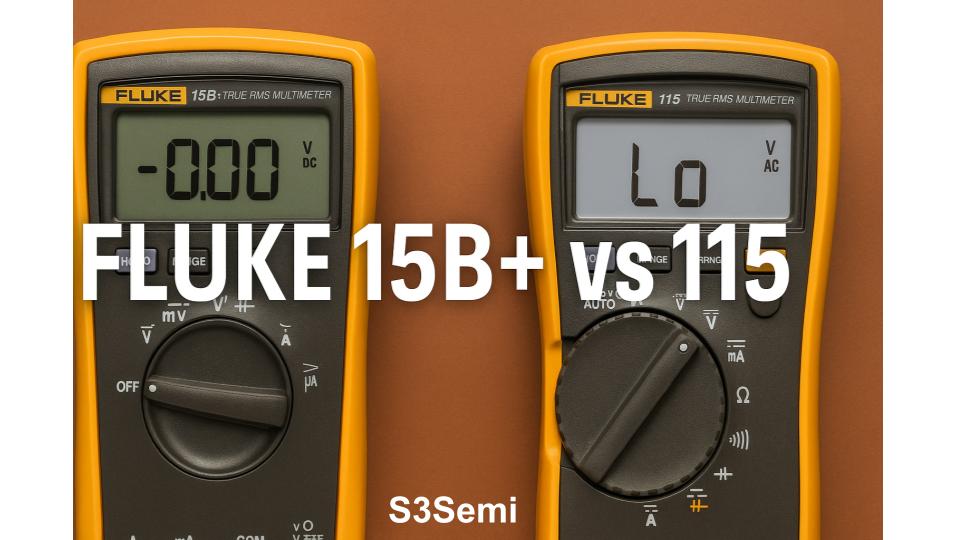🔧 When it comes to reliable digital multimeters, Fluke is a brand trusted by professionals and enthusiasts alike. Two of their popular models, the Fluke 15B+ and Fluke 115, often come up in discussions for entry-to-mid level multimeters.
🏷️ Fluke Multimeter Deals ⭐⭐⭐⭐
Both are rugged, accurate, and perfect for general electrical troubleshooting. But which one is right for you? Let’s dive into the details.
🛠️ Key Differences Between Fluke 15B+ and 115
While they may look similar at first glance, the Fluke 15B+ and 115 have some distinct differences in features, target users, and pricing.
- Fluke 15B+ is designed primarily for the Asian market but has gained global popularity due to its affordability and solid performance.
- Fluke 115 is positioned as a True RMS multimeter ideal for field technicians who need accurate readings on non-linear loads.
📊 Fluke 15B+ vs 115 Comparison Table
| Feature | Fluke 15B+ | Fluke 115 |
|---|---|---|
| Display | 4000-count LCD | ✅ 6000-count LCD |
| True RMS | ❌ No | ✅ Yes |
| AC Voltage Range | ✅ 0.1 mV to 1000 V | 0.1 mV to 600 V |
| DC Voltage Range | ✅ 0.1 mV to 1000 V | 0.1 mV to 600 V |
| AC Current Range | 0.1 μA to 10 A | 0.1 μA to 10 A |
| DC Current Range | 0.1 μA to 10 A | 0.1 μA to 10 A |
| Resistance | Up to 40 MΩ | Up to 40 MΩ |
| Capacitance | Up to 1000 μF | ✅ Up to 10,000 μF |
| Frequency Measurement | Up to 50 kHz | Up to 50 kHz |
| Temperature Measurement | ❌ No | ❌ No |
| Continuity & Diode Test | Yes | Yes |
| Auto/Manual Ranging | Yes (manual and auto) | Yes (manual and auto) |
| Backlight | Yes | Yes |
| Input Protection | Category III 600V, CAT II 1000V | Category III 600V, CAT IV 300V |
| Battery Type | 2 x AA | 9V Battery |
| Weight | Approx. 455g | Approx. 550g |
| 💳 Pricing | 💲Check price | 💲Check price |
⚡ Fluke 15B+: Pros & Cons
Pros:
- More affordable
- Measures up to 1000V AC/DC
- Simple and easy to use
- Backlit display
Cons:
- No True RMS (less accurate on non-linear loads)
- Limited capacitance measurement (up to 1000 μF)
- Lower display resolution (4000 counts)
⚡ Fluke 115: Pros & Cons
Pros:
- True RMS for accurate AC readings
- Higher display resolution (6000 counts)
- Higher capacitance range (up to 10,000 μF)
- CAT IV 300V safety rating
Cons:
- Pricier than Fluke 15B+
- Measures only up to 600V AC/DC
- Uses a 9V battery (less common than AA)
🏆 Which One Should You Choose?
- Choose Fluke 15B+ if you need a reliable, general-purpose multimeter at a lower price and you’re working mostly with standard voltage systems.
- Choose Fluke 115 if you need True RMS accuracy, frequently measure capacitance, and need higher safety ratings for fieldwork in more complex electrical environments.
Both are excellent meters, but the Fluke 115 edges out for professional use due to True RMS and better input protection. The 15B+ is a solid budget-friendly alternative for hobbyists and home electricians.



